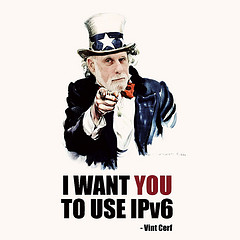IPv6: It's the end of the Internet as you know it, and I feel fine

On June 6, many Web sites and Internet providers will start supporting Internet Protocol version 6 (IPv6), the next generation Internet protocol, as part of their regular service. But, don't get into a panic; most users won't have a thing to worry about.
To get you up to speed, IPv4, and now IPv6, are the core protocols that the Internet uses for pretty much everything. Without them, we wouldn't have the Web, e-mail, YouTube, you name it. There was only one little problem with IPv4: it's 32-bit 4.3 billion addresses, which looked like so many in the 1970s, aren't even close to enough for today's Internet. Those mobile devices that we love so much like Android phones, iPads, etc. etc. have been sucking down IPv4 addresses like a gas guzzling car from the time of cheap gasoline. For the longest time, we managed to avoid running out of IPv4 addresses with the use of technologies like Network Address Translation (NAT) and Classless Inter-Domain Routing (CIDR), but those haven't been enough.
How to check on your Internet connection
As early as 1994, though, the Internet Engineering Task Force (IETF) saw that we were going to run out of Internet gas. So, they came with IPv6. And, how many addresses can it handle? With its 128-bit address space it can have up to 2^128 addresses or 40,282,366,920 billion billion billion usable addressed. Come the day we need to thinking about interstellar Internet, we can start worrying about an IPv8.
Meanwhile back on Earth, the Asia Pacific Network Information Centre (APNIC) ran out of IPv4 addresses last April. RIPE NCC, Europe's RIR will be the next to run out sometime in August Here in North America, we have until about June 2013 before our IPv4 address closet is bare. Today, all the other Regional Internet Registries (RIR), which are in charge of parceling out IP addresses are down to their last old-style IPv4 addresses.
In the meantime, network engineers and administrators have been testing IPv6 for years. Last June, during the World IPv6 Day, there was, just like the name said, a major global test of IPv6 over the Internet and it got an "A" on its report card.
So it is that as the tank empty warning lights starts blinking at the Internet, many major ISPs and Web sites are getting ready to offer IPv6 addresses, services, and support as well as IPv4.
To my knowledge, the following companies are now committed to green-lighting IPv6 by or on June 6:
ISPs:
- AT&T
- Comcast
- Free Telecom
- Internode
- KDDI
- Time Warner Cable
- XS4ALL
Content Delivery Networks (CDN)s:
- Akamai
- Limelight
Networking original equipment manufacturers (OEM)s:
- Cisco
- D-Link
- Linksys
- AOL
- Microsoft
- Microsoft Bing
- Netflix
- Yahoo
Some companies have already started adding IPv6. Comcast is now deploying IPv6 nationally. Facebook will be turning on a beta site in May to make sure there are no unexpected surprises.
So, what does this mean for you? Well, for most of you, watching Netflix online over the Internet, reading this story on ZDNet, whatever, it won't mean a thing. The address you've been assigned by your ISP is going to vanish out from underneath you.
You see this level of the Internet is a lot like your car. Yes, mechanically things are going to be quite different under the hood. But, you'll be able to put your key in the ignition and drive, or turn on your computer and start wandering the Web. Mechanics care about what's under the hood, Joe or Jane user usually don't need to know or care.
So for home users and small businesses, you don't need to do a thing about IPv6. You'll still be able to use the Internet for at least the rest of the teens without doing a thing. Eventually, say 2020, you may need to replace your router to connect with your ISP or gain full access to the entire Web, but that's a long way away. I wouldn't sweat it.
You also won't need to replace your existing router for one that supports IPv6 anytime soon. Come the day in the twenty-twenties that you must have IPv6, every router will support it. In the meantime, your old home router will work just fine.
If you have a growing business, though, it's a different story. If your business is expanding, adding new branch offices, or just deploying a lot more Web sites then you, you my friend will need to get to know IPv6 better real soon now.
Or, to be more exact, you're going to need network administrators and engineers who know IPv6 well. Yes, there are a lot of technologies that will let you run IPv6 and IPv4 together, but they won't save your or IT staff from IPv6's complications. In addition, we're already seeing our first IPV6 Distributed Denial of Service (DDoS) attacks. I don't think, I know, there will be many more IPv6 attacks as it rolls out.
If you have a business or organization that's moving up in the world and the Internet, you should start hiring people who know IPv6. They won't be cheap. You can also talk to companies like Hurricane Electric, with years of enterprise IPv6 deployment experience, to help you. While ordinary users don't have anything to sweat about this summer when it comes to IPv6, it's well past time for major players to start worrying about their IPv6 deployment plans.
Related Stories:
Facebook enabling IPv6 on beta site next month
First IPv6 Distributed Denial of Service Internet attacks seen
All IPv6 Internet, All the time
Hurricane Electric takes its IPv6 expertise to the data-center
